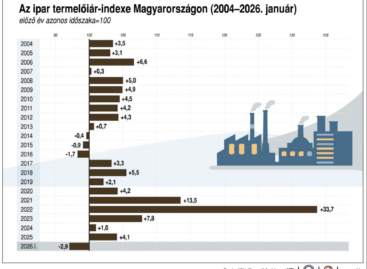It is expected that the burden of food shopping for households will no longer increase
Food inflation in Hungary decreased from 44 percent in January to 43.3 percent in February in an annual comparison. After 17 months of continuous growth, the slowdown for the second month is still primarily the result of comparing this month’s data to higher prices a year ago – the analysts of MKB Bank and Takarékbank’s Agricultural and Food Business Branch pointed out by the Central Statistics Office (KSH) in response to the inflation data published on Wednesday, adding that the burden of grocery shopping for households is not expected to increase any further.

(Photo: Pixabay)
While the price increase measured from January to February 2022 was still 2.1 percent on average, the same figure decreased to 1.7 percent in the same period of 2023. “There are of course exceptions, such as the coffee consumed by many of us, which rose in price by 6 percent from January to February,” pointed out senior analyst Csaba Héjja. According to the February data, the monthly price increase for dairy products was well below the average, and in fact, an examination of the raw data reveals that the prices of Trappist cheese – which rose extremely high in stores last year – and sour cream also fell. “The latter trend may continue in the near future, as European milk and milk product prices show a greater decrease than domestic ones. The main reason for this is the slight oversupply due to the expansion of milk production and the decrease in demand,” explained Csaba Héjja.
At the same time, the expert added that compared to the same period of the previous year, milk and milk products continued to increase in price the most, that is, despite the fact that the price increase has slowed down and the price of some products has decreased somewhat, this category of food purchased in the store still represents the biggest burden for households. In the case of dairy products, the price increase of 70 percent in one year is followed by baked goods and sweets, as well as spices by 50 percent. However, a slightly smaller price increase of 37 percent took place in the case of meat in one year.
“According to our previous estimates, due to the higher benchmark and other determining factors, store food prices may peak in March, and the domestic and international drop in grain prices also predicts this,” said Csaba Héjja. “However, this does not mean that we will be able to buy food for the same price as before the drastic price increase in 2021,” he emphasized.
Analysts from MKB Bank and Takarékbank’s Agricultural and Food Business Branch highlighted among the mentioned determining factors that energy prices are decreasing on the world market, and due to the decrease in gas prices, the price of fertilizer is also lower, which eases the pressure on production costs, not to mention the food industry about the reduction of energy costs. The easing of recessionary expectations and the strengthening of the forint also point to the fact that there is no need to expect further drastic food price increases. “Of course, the weather conditions at both domestic and international levels can override these expectations,” added Csaba Héjja.
“In summary: we still believe that, according to our expectations, food inflation may decrease to single digits in Hungary by the end of the year,” he said.
Related news
KSH: The volume of exports of food, beverages and tobacco decreased by 5.7 percent, while imports decreased by 13 percent
🎧 Hallgasd a cikket: Lejátszás Szünet Folytatás Leállítás Nyelv: Auto…
Read more >KSH: In January 2026, industrial producer prices were on average 2.9 percent lower than a year earlier and 0.9 percent higher than the previous month
🎧 Hallgasd a cikket: Lejátszás Szünet Folytatás Leállítás Nyelv: Auto…
Read more >KSH: in January, the number of guests increased by 5.3 percent and guest nights by 3.6 percent compared to a year earlier
🎧 Hallgasd a cikket: Lejátszás Szünet Folytatás Leállítás Nyelv: Auto…
Read more >Related news
How does the forint exchange rate affect consumer prices?
🎧 Hallgasd a cikket: Lejátszás Szünet Folytatás Leállítás Nyelv: Auto…
Read more >HELL CITY has arrived, led by Michele Morrone
🎧 Hallgasd a cikket: Lejátszás Szünet Folytatás Leállítás Nyelv: Auto…
Read more >Two million people have already voted, so 57 million forints will be given to locals in 125 settlements, courtesy of Tesco
🎧 Hallgasd a cikket: Lejátszás Szünet Folytatás Leállítás Nyelv: Auto…
Read more >







